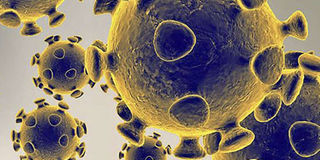Covid-19 inflammatory syndrome now seen in adults

An illustration image of the Covid-19 coronavirus, obtained on February 27, 2020, courtesy of the US Food and Drug Administration. PHOTO | AFP
What you need to know:
- In New York, experts were able to notice the disease only after the city passed its current Covid-19 peak where dozens of children who had been exposed to the respiratory illness were being taken ill without Covid-19 symptoms like coughing.
- They also did not have severe respiratory distress.
A rare multisystem inflammatory syndrome previously diagnosed in children and teenagers after being exposed to Coronavirus is being reported in older adults.
The disease, known as Kawasaki was first reported in children who at first did not appear to contract Covid-19 but later found to exhibit a more serious illness. Kawasaki disease exclusively affects children. It is thought to be triggered by previous infection.
The condition, officially called Multisystem Inflammatory Syndrome in Children (or MIS-C) can attack multiple organs, impair heart function and weaken heart arteries. Doctors at New York University, in a report on Saturday in the Lancet medical journal, reported a similar case in a 45-year-old man.
Last month, another team of doctors at Maimonides Medical Center in Brooklyn reported in the American Journal of Emergency Medicine a case in a 36-year-old woman. While both research teams cautioned against drawing conclusions from these isolated cases, they said they want to "heighten awareness" of the possibility that the syndrome can occur in adults.
“As Sars-CoV-2 spreads and awareness of MIS-C grows, the number of reported cases continues to increase. As of June 30, 230 paediatric MIS-C cases and two deaths have been reported in New York state, USA,” the team of scientists wrote.
In late April, reports began to emerge of a multisystem inflammatory syndrome in children MIS-C related to Sars-CoV-2 virus which causes Covid-19 infection.
Unusual numbers of children and teenagers living in Covid-19 hotspots like Lombardy, Italy and New York City in April developed an inflammatory condition MIS-C that mimicked Kawasaki disease. In many cases, the children have also tested positive for Covid-19 antibodies, suggesting the syndrome followed a viral infection.
In New York, experts were able to notice the disease only after the city passed its current Covid-19 peak where dozens of children who had been exposed to the respiratory illness were being taken ill without Covid-19 symptoms like coughing. They also did not have severe respiratory distress.
Instead, they had sky-high inflammation and some combination of fever, rashes on their hands and feet, diarrhea, vomiting, and very low blood pressure. When ICU doctors around the world gathered for a weekly online Covid-19 call on May 2, doctors elsewhere began sharing similar observations.
Although this patient's Kawasaki-like presentation bears a strong resemblance to MIS-C, as recently described in children, the team added that the case in the New York University was an isolated one and a larger study was needed to ascertain if there was a disease pattern.
Kawasaki disease, also known as Kawasaki syndrome, has a well-defined set of symptoms, including a persistent high fever, bloodshot eyes, redness around the mouth, a body rash and redness and swelling of the feet and hands. Although it primarily affects children younger than five years of age, the disease occurs worldwide, with the highest incidence in Japan, and it most often affects boys and younger children.
The recent surge in this disease prompted health advisories by the US Centers for Disease Control and Prevention (CDC), the Royal College of Paediatrics and Child Health, (UK) and World Health Organisation (WHO)


